Eureka Seven: Good Night, Sleep Tight, Young Lovers Blu-ray Movie
HomeEureka Seven: Good Night, Sleep Tight, Young Lovers Blu-ray Movie 
Kôkyô shihen Eureka Sebun: Poketto ga niji de ippaiBandai Entertainment | 2009 | 117 min | Not rated | Mar 02, 2010
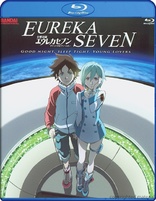
Movie rating
6.2 | / 10 |
Blu-ray rating
| Users | 3.5 | |
| Reviewer | 4.0 | |
| Overall | 3.8 |
Overview
Eureka Seven: Good Night, Sleep Tight, Young Lovers (2009)
For almost half a century, mankind has been at war with a mysterious entity known as the Eizo. It is the year 2054 and human-kind is on the brink of destruction. A select few are evacuated to colonization spaceships and the government is about to fire their doomsday device, the Hammer of God. In the middle of this war are two teenagers, Renton and Eureka; two childhood friends who were separated when Eureka was kidnapped by government forces eight years ago. Renton is now a soldier, piloting the Nirvash, aboard the Gekoo led by Holland Novak but the crew of the Gekko is actually rebels with their own mission. Renton and Eureka are now reunited and fate will test the young lovers as they fight the Eizo, government forces and even Holland. Their love will be the key to mankind's future and fulfilling their dreams.
Starring: Yûko Sanpei, Kaori Nazuka, Keiji Fujiwara, Michiko Neya, Shigenori Yamazaki| Anime | Uncertain |
| Foreign | Uncertain |
| Action | Uncertain |
| Sci-Fi | Uncertain |
Specifications
Video
Video codec: MPEG-4 AVC
Video resolution: 1080p
Aspect ratio: 1.78:1
Original aspect ratio: 1.78:1
Audio
English: Dolby TrueHD 5.1
Japanese: Dolby TrueHD 5.1
Subtitles
English
Discs
50GB Blu-ray Disc
Single disc (1 BD)
Playback
Region A (locked)
Review
Rating summary
| Movie | 4.0 | |
| Video | 4.0 | |
| Audio | 4.5 | |
| Extras | 2.0 | |
| Overall | 4.0 |
Eureka Seven: Good Night, Sleep Tight, Young Lovers Blu-ray Movie Review
By a show of hands, how many of you thought this was a film about seven guys discovering gold?
Reviewed by Dustin Somner April 6, 2010The Eureka Seven franchise originally began as a fifty episode anime series created by Bones anime studio and directed by Tomoki Kyoda. Released over the course of one year (spring 2005 through spring 2006), the show spawned a 23 chapter manga series, four light novels, three video game adaptations, and eventually led to a two-hour theatrical production helmed by the director of the original series (Kyoda). It’s a risky business to take a much-beloved story and completely rework it from the ground up, but that’s exactly what writer/director Kyoda envisioned when given the opportunity to tackle a film version. Naturally, some fans will despise the perceived bastardization of the original series, and complain about what “could have been” until they’re blue in the face. Having never witnessed the full-length series prior to this review, I can’t offer much comfort to that specific group of fans. However, as a long-time fan of all things anime, I’m compelled to commend Kyoda on crafting a beautiful concept that remains accessible to any anime enthusiast, and not just the hardcore Eureka Seven fans. After all, the ultimate goal of any anime production should be centered on mass appeal, so alienating a substantial portion of the anime market would seem counterproductive.
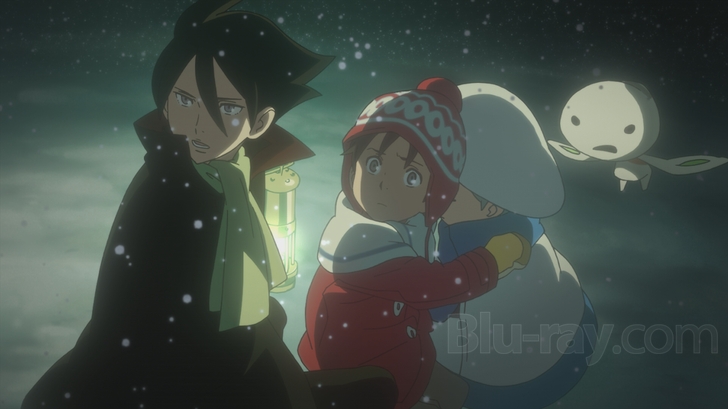
A young Renton protects Eureka.
In 2054, Earth’s become a battlefield between the dwindling human race and an expanding alien menace known as the EIZO. Fearing for the safety of the planet, the leaders of humanity created a vast weapon called the “Hammer of God”, which they intend to use as a last resort against the EIZO home base. The unfortunate side effect of utilizing the destructive device would be the decimation of a portion of Earth’s surface, leaving irreversible scars on our home planet. In the meantime, a battle wages on the surface of the planet between Earth’s military forces, the bug-like alien invaders, and a rogue team of military operatives aboard an airship known as the Gekko. Led by Holland Novak, the soldiers and crew of the Gekko pursue a unique young girl with the power to end the war, and bring about a prophecy foretold in a mysterious mythological story. Fighting alongside Holland is a boy named Renton, who’s established a close bond with a cuddly larvae known as Nirvash (a small creature with the ability to transform into a large mecha unit). As a child, Renton formed a powerful relationship with a young girl named Eureka, but was unable to protect her when soldiers from the military dragged her away to be used in an unknown government plot. When Eureka resurfaces 10 years later, new questions are raised regarding the part she will play in the countdown to doomsday, as humanity makes their final stand. Is Eureka the girl from the prophecy, or merely a pawn meant to sidetrack Renton from his mission against the EIZO?
Eureka Seven: GNSTYL is a fantastic example of anime storytelling. When I initially watched the film, I had no idea it wasn’t a condensed version of the original series, and assumed the creators retread over every main story element from the 50-part anime series. It wasn’t until I dug into the special features that I truly understood how far director Tomoki Kyoda strayed from the original concept, leaving only character names and small elements of the plot intact. Other theatrical productions have gone in this direction as well (Escaflowne), so I wouldn’t say this is a unique concept in the anime world, but some directors pull it off much better than others.
There are several pieces that make Eureka Seven: GNSTYL a memorable experience. First, the dynamic nature of the storytelling allows the plot to unfold in a manner that constantly keeps you guessing, revealing just enough information at key turning points in the story. This runs contrary to the storytelling structure of many productions released on western shores, which rarely drop you straight into the action and let the story unfold as you go. As a result, there’s tremendous residual value in future visits, since I doubt you’ll understand every character’s motivations or subtle twists until you watch it a second or third time. The pacing of the plot is also superb, since it keeps everything flowing at a brisk pace and doesn’t allow for the long stretches of dialog found in most cerebral anime productions (a category I would certainly place this film in). Emotions run high, action sequences are abundant, and key points of the story are revealed in quick narrative segments that avoid long explanatory scenes.
Digging substantially deeper into the story (for those of you who’ve seen the film), I was fascinated with the back story on the crew of the Gekko, and their unique medical condition. Their plight struck an excellent balance between good versus evil, allowing each viewer the opportunity to draw their own conclusions. I can’t say I enjoyed the way their journey ended after such an intriguing prologue to their adventure, but at least I somewhat appreciate the deeper meaning behind their actions in the closing minutes of the film (especially during my second viewing).
In the end, I only have two notable complaints regarding the series, and they are both merely reflections of personal taste. First, since the relationship between Eureka and Renton is a key element within the story, I was slightly underwhelmed by the connection developed along the way. It’s almost as if director Kyoda couldn’t decide if they should acquire a strong romantic bond, or remain best friends. This problem is compounded by the somewhat odd ending to the story, and the unknown path of their future relationship. Speaking of the ending, my second minor complaint is centered on the lack of a cohesive conclusion to the story. I can’t give too much away without spoiling elements in the plot, so I’ll simply mention my dismay with the seemingly abstract ending to the film, which forces viewers to imagine their own finale. I don’t necessarily prefer everything to be wrapped up in a nice neat bow, but when we’ve taken a complex 116-minute journey with these characters, it would be nice to know what the future holds for them. Even after two viewings, I’m still left scratching my head in bewilderment as the credits role (as a side-note, director Kyoda noted in the “making-of” supplement that he originally had an epilogue explanation by Renton in the closing minutes of the film, but chose to go with this ending instead).
Eureka Seven: Good Night, Sleep Tight, Young Lovers Blu-ray Movie, Video Quality 
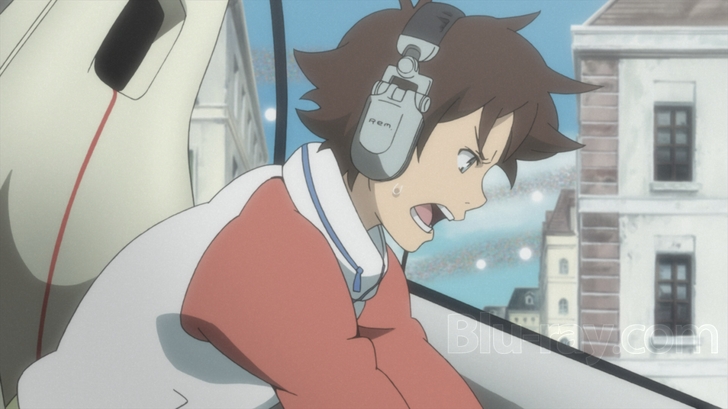
Presented in 1080p utilizing the AVC codec (at an average bitrate of 28Mbps), Eureka Seven: Good Night, Sleep Tight, Young Lovers continues an impressive streak of high-quality Blu-ray titles from Bandai. That's not to say there aren't subtle weaknesses worth pointing out, but when you look at the visual quality from a big-picture view (no pun intended), there's plenty of reason to rejoice. Studying the lines throughout the image, you won't notice a single instance of stair-stepping, and every curve or border retains crisp edging. Likewise, the color palette of the film appears entirely accurate to the source material, creating lush backgrounds full of bold hues. On occasion, the animation demands a dramatic drop in the color saturation throughout the image (taking on almost monochromatic tones), but these rare scenes are intentionally stylized in that manner, and fit within the environment of the specific scene. Unfortunately, the one area where the transfer slips from time to time is the depth of black levels, which appear jet black in some segments, and a subtle gray in others. When dealing with animated productions it can become difficult to separate issues present in the original animation versus a weakness of the transfer, but either way I'd like to see a bit more consistency in the rendering of blacks. Fortunately, even in the problematic sequences I just discussed, contrast steps in to create adequate differentiation between varying shades, and partly rectifies the situation. Getting back to the positive aspects of the transfer, I never noticed a hint of artifacting, edge-enhancement, or other digital anomaly, and those with an aversion to DNR will be pleased to know there's a noticeable layer of grain over many scenes throughout the film, supporting a lack of tampering in the creation of this transfer.
Eureka Seven: Good Night, Sleep Tight, Young Lovers Blu-ray Movie, Audio Quality 

If you're a native language purist with a strict no-dub policy on anime productions, consider yourself lucky. Unlike the recent release of Mobile Suit Gundam Unicorn, Eureka Seven carries a relatively low sticker price despite the inclusion of dual lossless audio tracks. As a result, we're given the opportunity to own a highly entertaining anime film that hasn't been stripped of its native track as a result of licensing rights or the potential for international importation (such as the recent release of Kurokami). As many of you know, anime always carries the potential to split viewer preference when it comes to choosing between the English or Japanese language track, so it's often viewed as a big deal when a release contains equally proficient options (after all, nobody wants one camp left out in the cold). Getting down to the nuts and bolts of the two tracks, I can't say I noticed a dramatic difference in any area aside from the dialogue. The moments of aerial combat are intense, fantastical elements such as the Hammer of God (a large space cannon) offer creative use of the soundstage, and the musical score is a key element in setting the emotional tone of the story. Surround separation is incredibly dynamic (sometimes bordering on jaw-dropping), with extensive use of the rear sound stage and adequate LFE incorporation. Getting back to the dialogue, it seems the English track carries a slightly higher volume than the Japanese offering (especially the female voicework), but it's not substantial enough to raise doubts regarding the strength of the native mix.
In the end, both sides of the fan spectrum will be pleased with the effort on these well-balanced audio tracks, and can count this experience a subtle notch below demonstration-worthy.
Eureka Seven: Good Night, Sleep Tight, Young Lovers Blu-ray Movie, Special Features and Extras 
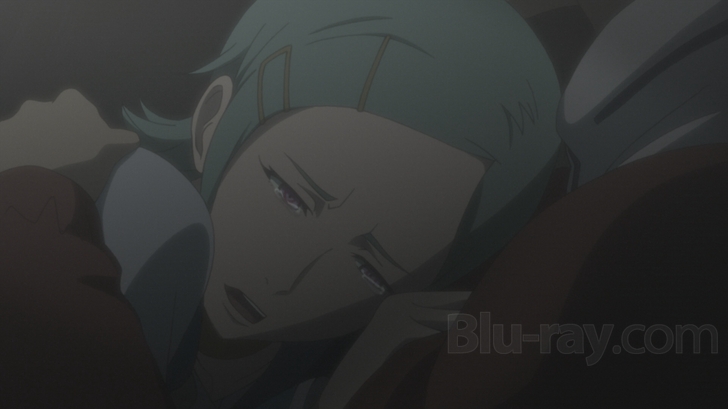
Making-of Featurette (1080i, Dolby Digital 2.0, 50:20 min): This comprehensive documentary chronicles the adaptation of the television series into a completely new production. Director Tomoki Kyoda provides substantial reflection on the new storyline, and what he hoped to accomplish within the condensed format of a theatrical release. Above all, he expresses his concerns over fan reaction, and explains why he made a film with wider appeal. In between the interview segments with Kyoda and members of the primary Japanese cast, we're taken backstage for a glimpse of the voice recording and sound editing sessions.
Rounding out the extras, we have three high-definition trailers for the film (one theatrical and two television spots), and three trailers for other Bandai productions (The Girl Who Leapt Through Time, Ghost in the Shell: Stand Alone Complex-Solid State Society, and Sword of the Stranger).
Eureka Seven: Good Night, Sleep Tight, Young Lovers Blu-ray Movie, Overall Score and Recommendation 
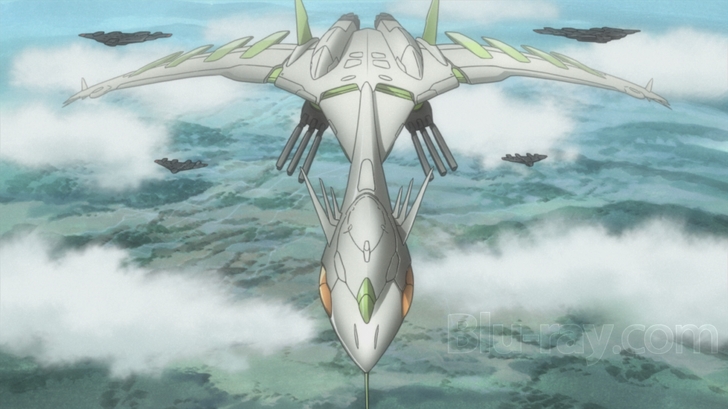
Eureka Seven: GNSTYL mixes style and substance in equal volumes. I thoroughly enjoyed every minute of the film, and despite my desire for a bit more explanation at the end, walked away feeling very satisfied with the overall experience. Those of you with an interest in cerebral anime productions will find plenty of reason to revisit this title in the future, making it an excellent investment in your growing anime collection.
Other editions
Eureka Seven: Good Night, Sleep Tight, Young Lovers: Other Editions
Similar titles
Similar titles you might also like

Evangelion: 1.11 You Are (Not) Alone
Evangerion shin gekijôban: Jo
2007

Redline
レドライン
2009

Xam'd: Lost Memories Complete Collection
Bōnen no Xam'd
2008-2009

Sword of the Stranger
ストレンヂア 無皇刃譚
2007

Full Metal Panic!: The Complete Series
Anime Classics / フルメタル·パニック!
2002

Gunbuster: The Movie
トップをねらえ! 劇場版
2006

Diebuster the Movie
トップをねらえ2! 劇場版 / Top wo Nerae 2!
2006

Evangelion: 2.22 You Can (Not) Advance
ヱヴァンゲリヲン新劇場版: 破 / Evangelion Shin Gekijōban: Ha
2009

Eden of the East Movie I: The King of Eden
2009

Trigun: Badlands Rumble
2010

Origin Spirits Of The Past
Special Edition
2006

The Disappearance of Haruhi Suzumiya
Suzumiya Haruhi no shôshitsu / 涼宮ハルヒの消失
2010

Eureka Seven: Part One
2005

Full Metal Panic? Fumoffu: The Complete Series
Classics
2003

Tsubasa RESERVoir CHRoNiCLE: Season One
S.A.V.E. Edition
2005

Durarara!! Box Set
2010

Code Geass Lelouch of the Rebellion: Complete Series
コードギアス 反逆のルルーシュ / コードギアス 反逆のルルーシュR2
2006-2008

Heroic Age: The Complete Series
2007

Fullmetal Alchemist Brotherhood: Box Set 2
鋼の錬金術師 FULLMETAL ALCHEMIST
2009-2010

Casshern Sins: The Complete Series
Essentials
2008-2009
